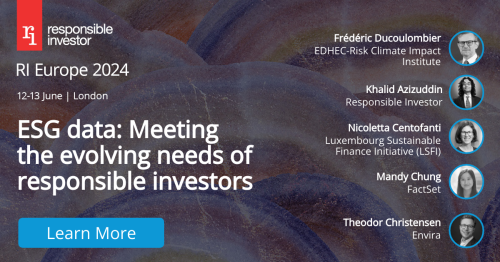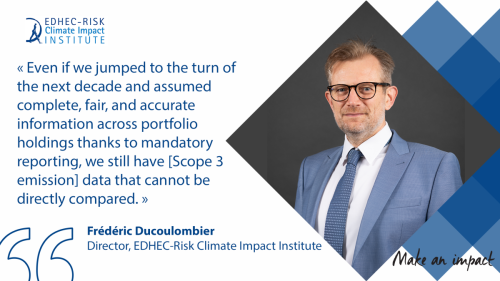
ESG data abundance and evolving investor needs: insights from Frédéric Ducoulombier at RI Europe conference
Written on 21 Jun 2024.

Frédéric Ducoulombier, Director of EDHEC-Risk Climate Impact Institute contributed to a panel discussion titled "ESG data: meeting the evolving needs of responsible investors” at responsible investor’s annual European conference, a two-day conference in the city of London. This event, the 17th edition of the series, was held in front of 600+ leading institutional investors to discuss the fast-changing sustainability regulations, the need to take decarbonization to the next stage, and the tools to support that transition even in uncertain political times.
Frédéric Ducoulombier contributed to a panel on ESG data challenges and opportunities comprised of Nicoletta Centofanti, CEO of the association that designs and implements the Luxembourg Sustainable Finance Strategy, Theodor Christensen, CEO of sustainable finance consultancy Envira and former Head of Sustainability and Climate at the Danish Financial Supervisory Authority, and Mandy Chung, VP ESG Product Manager at data and analytics provider FactSet. Senior Reporter Khalid Azizuddin moderated the panel.
The panel observed that, while institutional investors and their advisors used to complain about the unavailability of ESG data, the introduction of mandatory corporate reporting on climate and sustainability in multiple jurisdictions; efforts by investors, issuers, and NGOs to advance voluntary disclosures and produce data; and the continued dynamism of service providers all contributed to a shift towards an area of ESG data abundance. The discussion focused on the conditions necessary to make data decision useful for investors and the roles of the different parties in the sustainable investment value chain in relation to this.
Theodor Christensen underlined that more work was required to link sustainability information to financially material risks or opportunities and insisted that developing meaningful risk-based metrics remained paramount.
Mandy Chung explained that the key role of the data and analytics provider was to ensure quality and specifically comparability of data, and to support users in their assessments of data suitability for their own purposes.
Nicoletta Centofanti presented findings and recommendations from a newly released report by the LSFI ESG Data Working Group.[1] The report identified challenges related to data reliability, absence of global standards leading to issues of comparability and consistency; lack of transparency (notably in relation to methodologies); data acquisition, management and reporting costs; and complexity and rapid regulatory changes.
Frédéric Ducoulombier argued that the age of free and abundant ESG data would not put commercial data providers out of business. He argued that convergence of datapoint definitions and standardisation of assessment methods by reporting entities would be needed to make disclosures comparable. He drew on his recent work on value chain (a.k.a. Scope 3) emissions as an illustration (Scope for Divergence - The status of value chain emissions accounting, reporting and estimation, and implications for investors and standard setters)[2] and underlined that, even if we jumped to the turn of the next decade and assumed complete, fair, and accurate information across portfolio holdings thanks to mandatory reporting, we still have data that cannot be directly compared.
This is because the reference for corporate value chain emissions accounting is intended to help companies assert control over their emissions inventories and not to produce data that would support cross-corporate comparisons. Reporting entities can choose boundaries, data, and computation options that align with their capabilities, resources, and experience. These choices have very material impacts – the same company can look very different depending on the legitimate options it selects – hence the data are not fit for direct cross-corporate comparisons (and making sense of data reported by the same company over time requires controlling for changes in accounting options).
A trusted central party can add value here by collecting reported data (and where available information about accounting options across companies and time) and perform the necessary processing to output adjusted or modelled data that may support cross-corporate comparisons at a given (and over) time. Commercial data providers are well positioned to play this role. But of course, reporting entities, data users, and regulators may cooperate to increase the comparability of the data, and support the emergence of not-for-profit data initiatives.

Asked to comment on net-zero portfolio alignment, Frédéric Ducoulombier cautioned against top-level metrics such as financed emissions, warning that steering net-zero investment management by such metrics could fail to support real economic change or even undermine funding for key transition sectors as highlighted in EDHEC-Risk Climate Impact Institute’s recent Policy Contribution on greenwashing. The mere reporting of such topline figures he advised should always be accompanied by decomposition analysis to inform on underlying drivers[3]. Most importantly, practitioners should ensure that investment management decisions are made and implemented in manners that are consistent with, and can contribute to, stated objectives.
In this respect, he praised the work of investor alliances - such as the UN-convened Net Zero Asset Owner Alliance and the Paris-Aligned Asset Owners - whose target setting protocols and investment frameworks show genuine concern for real-economy impact and recognize that it is crucial to accompany corporate decarbonization along sectoral pathways and to support climate solutions. He underlined that both alliances rely on multicriteria analysis to assess alignment at asset level and explained that portfolio alignment metrics such as Implied Temperature Rise (ITR) required more work to become decision useful and comparable. [4]
Frédéric Ducoulombier concluded: “I would generally advise against attempts to collapse complex problems into single numbers – as the quote attributed to Albert Einstein says, everything should be as simple as it can be, but not simpler.”
The main takeaways from the discussion:
- The phase-in of mandatory corporate sustainability reporting promises more abundant ESG data.
- Data availability should not be confused with relevance or fitness for purpose.
- Cross-jurisdiction convergence and standardization of measurement methods require further efforts.
- Investors must be aware of data limitations and ensure that data and metrics fit their purposes.
- Further work is required to transform sustainability data into useful financial risk indicators.
- It is important to resist the temptation to collapse complex problems into a single metric, especially for portfolio construction.
- Net-zero investment management cannot be steered solely by financed emissions - multiple action levels are to be coordinated and sector and asset level action are required for real economy impact - PAOO and NZAOA provide proper frameworks.
- If a top figure must be reported, it must be decomposed to show the influence of underlying factors and attempt to discriminate between bona fide net zero investment and greenwashing.
- Implied Temperature Rise metrics need more work, but progress is being made.
Recommended readings:
Scope for Divergence - The status of value chain emissions accounting, reporting and estimation, and implications for investors and standard setters, Ducoulombier, F., Policy Report, EDHEC-Risk Climate Impact Institute, 2024 (March).
Decomposition of Greenhouse Gas Emissions Associated with an Equity Portfolio, Bouchet, V., The Journal of Impact and ESG, Volume 4, Issue 2, pp.35-55, 2023.
Implied Temperature Rise of equity portfolios: a sensitivity analysis framework, Bouchet, V., White Paper, Institut Louis Bachelier, 2024 (May).
EDHEC-Risk Climate Impact Institute’s Response to the European Supervisory Authorities’ Call for Evidence on Greenwashing, Ducoulombier, F., Policy Contribution, EDHEC-Risk Climate Impact Institute, 2023 (October).
Footnotes
[1] ESG Data, Outcome Report from LSFI’s Working Group, LSFI, 2024 (June).
[2] The reporting of these emissions remains mostly voluntary and is sparse, incomplete, and insufficiently focused on material sources. Meanwhile modelled Scope 3 emissions remain highly divergent across providers and lack the specificity required for fine-grain comparisons across entities. Putting these at the center of portfolio construction, as is required by the EU Benchmark Regulation, leads to disregarding efforts made by companies in the mitigation of their greenhouse gas emissions, which is inconsistent with the Paria Agreement objective to make finance flows consistent with transition pathways. What may have been an inconvenient truth when first voiced five years ago is now a mainstream view as reflected by recent white papers by net-zero investor coalitions and data provider FTSE Russell. In these respects, the reader may refer to Unsustainable Proposals – A critical appraisal of the TEG Final Report on climate benchmarks and benchmarks’ ESG disclosures and remedial proposals, Amenc, N. and F. Ducoulombier, Scientific Beta, 2020 (February); Ducoulombier, F., Understanding the Importance of Scope 3 Emissions and the Implications of Data Limitations, The Journal of Impact and ESG Investing, Vol.1, Issue 4, pp. 63-71. 2021 and (Scope for improvement: Solving the Scope 3 conundrum, LSEG, 2024 (January)).
[3] Recent useful work in this regard was performed by EDHEC Business School venture Scientific Portfolio (Decomposition of Greenhouse Gas Emissions Associated with an Equity Portfolio, Bouchet, V., The Journal of Impact and ESG, Volume 4, Issue 2, pp.35-55, 2023
[4]In this respect, he explained that the Portfolio Alignment Team of the Glasgow Financial Alliance for Net Zero had produced useful early work analyzing commercial tools and evolving views about key methodological steps and options, and he pointed to the work of Scientific Portfolio ESG Director Vincent Bouchet, supported by the French environmental agency (ADEME), quantifying the impact of methodological on the divergence of ITRs.

